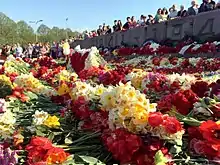Monument to the Liberators of Soviet Latvia and Riga from the German Fascist Invaders
The Monument to the Liberators of Soviet Latvia and Riga from the German Fascist Invaders (Latvian: Piemineklis Padomju Latvijas un Rīgas atbrīvotājiem no vācu fašistiskajiem iebrucējiem, Russian: Памятник освободителям Советской Латвии и Риги от немецко-фашистских захватчиков), unofficially known simply as the Victory Memorial[1] (Latvian: Uzvaras piemineklis, Russian: Памятник победы), is a memorial complex in Victory Park, Riga, Latvia erected in 1985 to commemorate the Soviet Army's victory over Nazi Germany in World War II. It was designed by sculptors Ļevs Bukovskis and Aivars Gulbis. The complex consists of a 79-meter tall obelisk and two groups of sculptures – Mother Motherland and a band of three soldiers.[2]
-Fragment.png.webp)

Controversy
In 1997 the monument was unsuccessfully bombed by members of Latvian ultra-nationalist group Pērkoņkrusts, two of whom died during the bombing,[3] while six others, including Igors Šiškins, in 2000 were sentenced for up to three years in prison.[4] Nowadays the monument remains a controversial subject, as many ethnic Latvians regard it not only as a symbol of Soviet victory in the Second World War, but also of the Soviet re-occupation of Latvia.[5][6] The monument's obelisk is sometimes referred to as "Moscow's finger" (Maskavas pirksts).[2]
In 2007 the Popular Front of Latvia and the alliance of Latvian WWII veterans sent an open letter to Prime Minister of Latvia Aigars Kalvītis urging him to prevent "any provocations that might discredit the Latvian state" and resolve any issues in regard to the monument's removal as it is "glorifying the ideals of a regime guilty of genocide that killed about 60 million people, including thousands of Latvians."[7]
After the relocation of Bronze Soldier in Tallinn the issue of the memorial was brought up again. Chairman of the nationalist All for Latvia! party Raivis Dzintars called on Riga Mayor Jānis Birks of the conservative TB/LNNK to organize a public discussion on the future of the monument, but Birks dismissed the calls as "very thoughtless and even harmful to Latvia". The chairman of the Union of Greens and Farmers parliamentary faction Augusts Brigmanis and the leader of Latvia's First Party/Latvian Way parliamentary faction Andris Bērziņš were similarly dismissive.[8]
In 2013 more than 11,000 signatures had been collected on the online petition website ManaBalss.lv to remove the monument and reconstruct Victory Square the way it was originally planned in the 1930s, before the Soviet occupation of Latvia in 1940, with the Justice Minister of Latvia Jānis Bordāns being among the supporters. Ministry of Foreign Affairs of the Russian Federation representative Alexander Lukashevich released a statement condemning the calls for monument's removal.[9][10]
On June 29, 2016, the Saeima Mandate, Ethics and Submissions Committee rejected the petition based on the argumentation of the Riga City Council that the location had already been developed and the Ministry of Foreign Affairs of Latvia that concluded that the monument was protected by the Latvian-Russian 1994 agreement on preservation and maintenance of memorials and burial sites.[11]
In 2019 a similar petition by the same initiator had gathered more than 10,000 signatures and on April 2 Saeima Mandate, Ethics and Submissions Committee began discussing it, with some members supporting the removal, some opposing it and some offering alternative solutions, such as renaming the memorial and building an interactive museum of occupation under it. At the same time, a counterinitiative by the Latvian Russian Union leader Tatjana Ždanoka on the protection of monuments against Nazism, including the Victory Memorial, had gathered 22,000 signatures.[12][13]
References and notes
| Wikimedia Commons has media related to Victory Monument (Riga). |
- The unofficial name of the monument cames from the Victory Park it is located in, which incidentally is not named after the Soviet or even Allied victory in World War II, but rather the 1919 victory over the West Russian Volunteer Army in the Latvian War of Independence.
- Hoffmann, Thomas; Makarychev, Andrey, eds. (2018). "Russia's monuments policy in the Baltic States". Russia and the EU: Spaces of Interaction. Abingdon: Routledge. p. 99. ISBN 978-1-138-30379-9.
- "Latvia". AXT. 1998. Archived from the original on 2009-01-10. Retrieved 2008-06-03.
- "Latvian Nationalists Imprisoned for Obelisk Bombing". The Moscow Times. May 30, 2000. Retrieved October 26, 2012.
- Ochser, Tim (May 16, 2002). "Monument divides society on Victory Day". The Baltic Times. Retrieved May 14, 2013.
- "WWII Victory Day still stirs controversy in Latvia". Expatica. May 9, 2012. Retrieved May 14, 2013.
- "WWII veterans call for removal of Soviet monument in Riga". The Baltic Times. January 21, 2007. Retrieved May 14, 2013.
- "Moving Latvian victory monument "would be very thoughtless"". The Baltic Times. May 17, 2007. Retrieved June 28, 2014.
- "Dombrovskis, take down that monument". The Baltic Times. October 24, 2013. Retrieved June 28, 2014.
- "Victory Monument removal drive picks up pace". The Baltic Times. October 29, 2013. Retrieved June 28, 2014.
- "Saeima committee rejects petition calling for restoration of original Victory Square in Riga". The Baltic Course. June 30, 2016. Retrieved September 5, 2016.
- "Saeima committee divided on residents' petition calling for demolition of Uzvaras Monument". The Baltic Course. April 2, 2019. Retrieved April 5, 2019.
- "Saeima committee divided on future of Soviet "Victory" monument". Public Broadcasting of Latvia. April 3, 2019. Retrieved April 5, 2019.